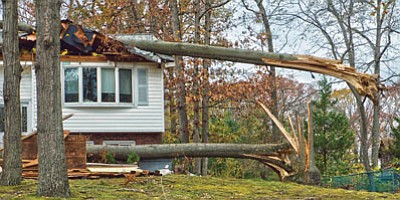BALTIMORE — After a big storm, your home, yard, auto or business may be in need of major repairs as a result of the wind or water damage. Maryland Attorney General Brian E. Frosh urges Marylanders to be wary of home repair scams and other consumer fraud that often follow in the wake of a storm’s destructive path.
“It’s unfortunate, but after big storms, we see a sudden gust of scammers swooping in, hoping to take advantage of desperate families and business owners trying to rebuild,” said Attorney General Frosh. “Marylanders should be wary of door-to-door salesmen using high pressure tactics to get your hard-earned money. You may never see that money again while the job goes undone.”
The vast majority of home repair contractors, tree removal companies and car repair shops in Maryland are reputable businesses doing good work for their customers. Many are eager to help their neighbors and their community recover from a disaster. These are people you are likely to know and trust. Attorney General Frosh urges consumers to be wary of people you do not know who solicit you at your home or business.
Warning signs that consumers should look for following severe weather include:
•Traveling salesmen who come knocking on your door immediately after a disaster
•High-pressure sales tactics
•Demands for up-front payments
•Demands for an immediate decision
•Advance-fee loans that “guarantee” a loan to rebuild your home or business
Before Marylanders give anyone their money, Attorney General Frosh advises Maryland homeowners and small businesses to be cautious and:
•Check to see if a home improvement contractor is licensed by the Maryland Home Improvement Commission and inquire about the contractor’s complaint history, by calling 410-230-6309 or visit http://www.dllr.state.md.us/license/mhic/.
•Check to see if a tree expert is licensed with the Department of Natural Resources byvisiting: http://dnr.maryland.gov/forests/Pages/programapps/newtreeexpert.aspx.
•Deal only with contractors who have an established Maryland business, and are licensed by the Maryland Home Improvement Commission.
•Obtain at least three bids for major repair work and check references. Be cautious if one of the bids is much lower than the others.
•Make certain that all important details concerning the work are written into the bid and contract, including: all of the work that the contractor has agreed to perform, the dates the work will begin and is expected to be completed, the total cost of the work, the type and quality of materials to be used, how and when payments will be made, and the provisions of warranties on the materials and labor.
Consumers are also advised to be wary of phony relief efforts, fraudulent charities and scam artists who use the name of an organization similar to a well-known charity. Marylanders should contribute only to organizations that they know well and that willingly provide written information about their charitable efforts. Consumers should avoid making cash donations and always make checks payable to the organization, not the individual soliciting. Consumers can protect themselves from charity scams by checking that a charity is registered with the state as required by law, by going to the Secretary of State’s website: http://sos.maryland.gov/Charity/Pages/SearchCharity.aspx.
Consumers may file a complaint with the Office of Attorney General’s Consumer Protection Division by going to: http://www.marylandattorneygeneral.gov/ or by calling 410-528-8662 or toll-free at 1-888-743-0023.
